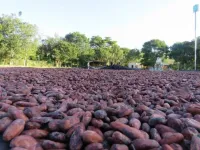Engineered yeast probiotic developed to treat inflammatory bowel disease
Designed from the yeast used to make beer, 'Y-bots' can target inflammation, tissue scarring and disturbances in the balance of microbes living in the gut
2021-06-28
(Press-News.org) The world of microbes living in the human gut can have far-reaching effects on human health. Multiple diseases, including inflammatory bowel disease (IBD), are tied to the balance of these microbes, suggesting that restoring the right balance could help treat disease. Many probiotics -- living yeasts or bacteria -- that are currently on the market have been optimized through evolution in the context of a healthy gut. However, in order to treat complex diseases such as IBD, a probiotic would need to serve many functions, including an ability to turn off inflammation, reverse damage and restore the gut microbiome. Given all of these needs, researchers from Brigham and Women's Hospital have developed a "designer" probiotic -- a thoughtfully engineered yeast that can induce multiple effects for treating IBD. Preclinical results from their work are published in Nature Medicine.
"We've taken yeast -- the very yeast that's used to make beer -- and we've given it the ability to sense inflammation and secrete an anti-inflammatory molecule," said corresponding author Francisco Quintana, PhD, an investigator in the Ann Romney Center for Neurologic Diseases at the Brigham. "We call this new platform 'Y-bots' (yeast robots) and see the potential here for developing therapeutics that can treat diseases of the gut tissue and more."
Previous research from the Quintana lab has helped illuminate the connection between the gut and diseases that affect the brain, suggesting potential applications for engineering probiotics beyond IBD.
Quintana and colleagues developed their probiotic using Saccharomyces cerevisiae, a species of yeast used in winemaking, baking and brewing. Using the gene editing technology CRISPR/Cas9, the researchers introduced genetic elements that could sense inflammation and respond to it by secreting an enzyme that can degrade a key molecule involved in inflammation. The engineered yeast can secrete different levels of enzyme, depending upon how much of the inflammatory signal is present at a location in the gut. This means that the probiotic can have a highly localized response to inflammation. In mice, the engineered yeast successfully suppressed intestinal inflammation, reduced fibrosis and restored a balanced gut microbiome.
To bring this new therapeutic platform to bear on IBD and other diseases in humans, Quintana and colleagues will need to conduct safety studies. They also plan to further refine and test the engineered yeast to see if they can speed up tissue repair. Beyond IBD, the team plans to investigate the use of engineered probiotics for treating a common side effect of cancer immunotherapy, colitis.
"We want to use the tools of synthetic biology to engineer what can be found in nature," said Quintana. "By engineering probiotics, our goal is to create more personalized, localized and highly controlled medications for treating diseases of the gut and beyond."
INFORMATION:
This work was supported by the National Institutes of Health (grants NS102807, ES02530, ES029136, AI126880), the National MS Society (RG4111A1), International Progressive MS Alliance (PA-1604-08459) and Natural Sciences Engineering Research Council of Canada (NSERC 492911). Quintana and four co-authors filed a patent for the use of engineered yeast to treat inflammation.
Paper cited: Scott, B et al. "Self-Tunable Engineered Yeast Probiotics for the Treatment of Inflammatory Bowel Disease" Nature Medicine DOI: 10.1038/s41591-021-01390-x
ELSE PRESS RELEASES FROM THIS DATE:
2021-06-28
A new discovery in rats shows that the brain responds differently in immersive virtual reality environments versus the real world. The finding could help scientists understand how the brain brings together sensory information from different sources to create a cohesive picture of the world around us. It could also pave the way for "virtual reality therapy" for learning and memory-related disorders ranging including ADHD, Autism, Alzheimer's disease, epilepsy and depression.
Mayank Mehta, PhD, is the head of W. M. Keck Center for Neurophysics and a professor in the departments of physics, neurology, and electrical and computer engineering at UCLA. His laboratory studies a brain region called the hippocampus, which is a primary driver of learning and memory, ...
2021-06-28
An international team of astronomers has observed the first example of a new type of supernova. The discovery, confirming a prediction made four decades ago, could lead to new insights into the life and death of stars. The work is published June 28 in Nature Astronomy.
"One of the main questions in astronomy is to compare how stars evolve and how they die," said Stefano Valenti, professor of physics and astronomy at the University of California, Davis, and a member of the team that discovered and described supernova 2018zd. "There are many links still missing, so this is very exciting."
There ...
2021-06-28
NEW YORK, NY (June 28, 2021)--In the first analysis of its kind, researchers at Columbia University Vagelos College of Physicians and Surgeons and several other institutions have linked distinct patterns of genetic mutations with obsessive-compulsive disorder (OCD) in humans.
The work, published online June 28 in Nature Neuroscience, confirms the validity of targeting specific genes to develop new OCD treatments and points toward novel avenues for studying this often debilitating condition.
OCD, which affects 1% to 2% of the population, often runs in families and genes are known to play a large role in determining who develops the disease. However, the identity of many OCD genes remains unknown.
"Many neurological diseases are ...
2021-06-28
Slow earthquakes are long-period earthquakes that are not so dangerous alone, but are able to trigger more destructive earthquakes. Their origins lie in tectonic plate boundaries where one plate subsides below another. Though the causal mechanism is already known, there has been a lack of data to accurately model the life cycle of slow earthquakes. For the first time, researchers use deep-sea boreholes to gauge pressures far below the seafloor. They hope data from this and future observations can aid the understanding of earthquake evolution.
The surface of the Earth lies upon gargantuan ...
2021-06-28
New York, NY--June 28, 2021--Predicting what someone is about to do next based on their body language comes naturally to humans but not so for computers. When we meet another person, they might greet us with a hello, handshake, or even a fist bump. We may not know which gesture will be used, but we can read the situation and respond appropriately.
In a new study, Columbia Engineering researchers unveil a computer vision technique for giving machines a more intuitive sense for what will happen next by leveraging higher-level associations between people, animals, and objects.
"Our algorithm is a step toward machines being able to make better predictions about human behavior, and ...
2021-06-28
Sixteen of the 146 health-related All-Party Parliamentary Groups (APPGs) in the Houses of Parliament (UK) received over a £1 million in payments from 35 pharmaceutical companies between 2012-2018 according to a new study.
The researchers behind the analysis from the University of Bath's Centre for the Analysis of Social Policy suggest their findings reveal a worrying lack of transparency over payments received and potential conflicts of interests towards public policy.
Through their research they extracted details from 6,624 entries about funding ...
2021-06-28
Experts estimate more than 6 million Americans are living with Alzheimer's dementia. But a recent study, led by the University of Cincinnati, sheds new light on the disease and a highly debated new drug therapy.
The UC-led study, conducted in collaboration with the Karolinska Institute in Sweden, claims that the treatment of Alzheimer's disease might lie in normalizing the levels of a specific brain protein called amyloid-beta peptide. This protein is needed in its original, soluble form to keep the brain healthy, but sometimes it hardens into "brain stones" or clumps, called amyloid plaques.
The study, which appears in the journal EClinicalMedicine (published by the Lancet), comes on the heels of the FDA's conditional approval of a new medicine, aducanumab, that ...
2021-06-28
CORVALLIS, Ore. - Oregon State University researchers have some good news for the well-meaning masses who place bird feeders in their yards: The small songbirds who visit the feeders seem unlikely to develop an unhealthy reliance on them.
"There's still much we don't know about how intentional feeding might induce changes in wild bird populations, but our study suggests that putting out food for small birds in winter will not lead to an increased dependence on human-provided food," said Jim Rivers, an animal ecologist with the OSU College of Forestry.
Findings from the research, which looked at black-capped chickadees outfitted with radio frequency identification tags, ...
2021-06-28
New York, NY (June 28, 2021) - Patients with a type of blood cancer called multiple myeloma had a widely variable response to COVID-19 vaccines--in some cases, no detectable response--pointing to the need for antibody testing and precautions for these patients after vaccination, according to a study that will be published in Cancer Cell this week.
Mount Sinai researchers found that multiple myeloma patients mount variable and sometimes suboptimal responses after receiving the Pfizer-BioNTech or Moderna COVID-19 vaccines. Almost 16 percent of these patients developed no detectible antibodies after both vaccine doses. These findings may be relevant to other cancer patients undergoing treatment and to immunocompromised patients.
"This study ...
2021-06-28
Did you know chocolate comes from cocoa beans grown in some of the most biodiverse tropical landscapes on the planet? The cocoa tree (Theobroma cacao) is farmed within biodiversity hotspots of West Africa, South America, and Southeast Asia. Cocoa was traditionally grown under a canopy of native trees that provided habitat for birds and other wildlife. However, pressure to increase cocoa production has pushed many farmers to clear forest and eliminate the shade trees on their farms.
An estimated 2-3 million hectares of tropical forest were converted to cocoa from 1988-2008 with severe consequences for biodiversity. Unsustainable cocoa monocultures (agricultural ...
LAST 30 PRESS RELEASES:
[Press-News.org] Engineered yeast probiotic developed to treat inflammatory bowel disease
Designed from the yeast used to make beer, 'Y-bots' can target inflammation, tissue scarring and disturbances in the balance of microbes living in the gut




